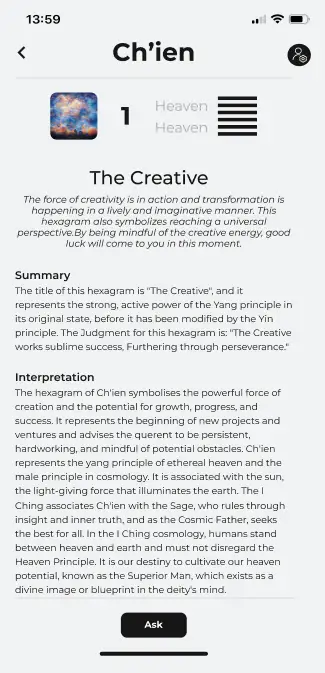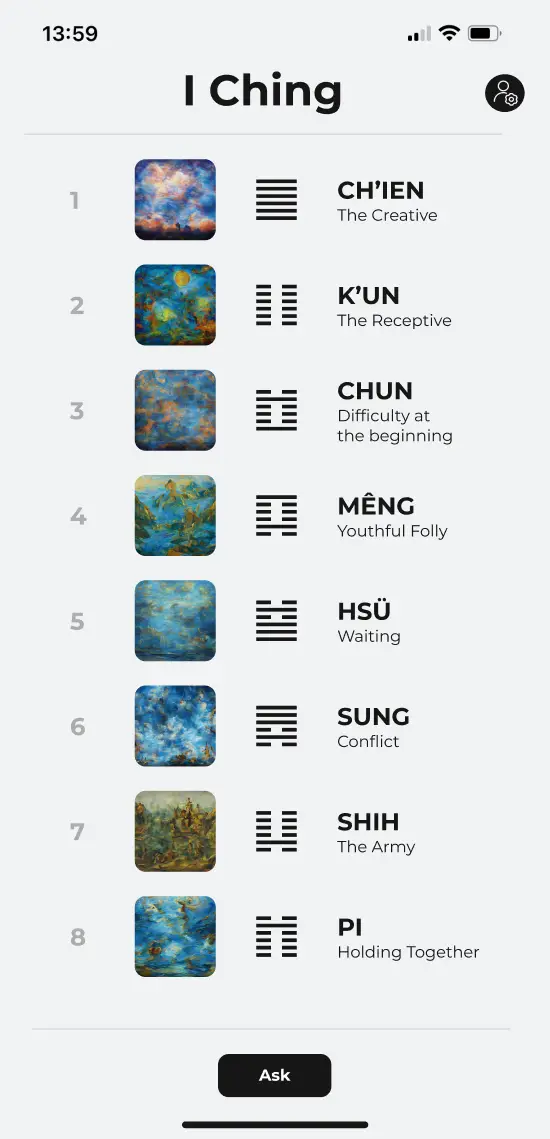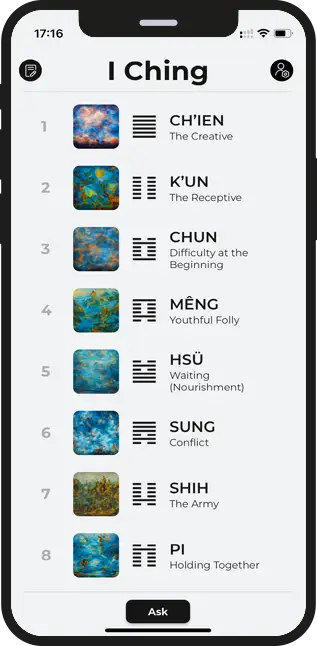
Mountain
Water
Hexagram 4 - Youthful Folly - MÊNG
Every experience offers an opportunity to learn and grow. It's essential to approach each new lesson with an open mind and a willingness to learn, even if it means admitting ignorance. The I Ching advises that even those who may consider themselves foolish can attain wisdom by humbly following the guidance of the Sage.
Summary
Represents the potential for making mistakes and acting impulsively due to inexperience or lack of wisdom. The Judgment for this hexagram is: "Youthful Folly has success. It is not I who seeks the young fool; The young fool seeks me. At the first oracle, I inform him. If he asks two or three times, it is importunity. If he importunes, I give him no information. Perseverance furthers."
Interpretation
The Hexagram explains the relationship between the wise Sage who communicates through the I Ching and the seeker who seeks its guidance. The Sage will only reveal their insights if the seeker has a receptive attitude, open-mindedness and willingness to suspend disbelief. If the seeker is sceptical, apathetic, or hostile, the oracle's messages will remain indecipherable as the Sage chooses to refrain from engaging with those who do not approach with humility. It is important to let go of preconceived notions that may prevent growth and learning. The I Ching serves as a means of gaining a cosmic perspective on life, and the lessons learned can be applied to daily experiences. The hexagram acknowledges that mistakes and ignorance are a natural part of the journey and reminds us to approach others with an open mind, recognising that within everyone lies the potential for greatness. If they remain closed off, we must let them go, allowing them to learn from their own mistakes and experiences but not give up on them entirely. It is essential to let go of anger and approach the situation with a clear and open mind.
Sage Advice
Hexagram 4 offers a powerful reminder to approach life with humility, patience, and a willingness to learn. It emphasises the importance of seeking guidance and advice from more experienced and being aware of one's limitations to avoid making mistakes and acting impulsively. The I Ching advises to "be constantly mindful and give no cause for regret" and to "let the young be guided by the old." This suggests that by being cautious and humble in our actions, we can avoid the pitfalls of youthful folly and learn from the wisdom of those who have come before us.
It is also essential to take responsibility for our mistakes and not repeat them. By being mindful of our actions and learning from our mistakes, we can continue to grow and improve. Approach life with a humble and patient attitude, seek guidance and advice from more experienced and be aware of one's limitations. This will help us avoid the pitfalls of youthful folly and continue to grow and improve on our journey.
Line 1
Speaks to the need for self-discipline and inner reflection to truly understand and learn from life's experiences. Removing any limitations or constraints holding us back is essential, as continuing on the current path will only lead to embarrassment. To truly master life, we must go beyond being told what to do and actively apply our knowledge and learning. This may involve direct and sometimes uncomfortable experiences, but in the end, it will strengthen us and the lessons learned will become ingrained in our hearts as inner truth. It is crucial not to become complacent or to rely on others to guide us through life. Instead, we must take responsibility for our growth and development. However, it is also important not to become too rigid or over-zealous in our pursuit of understanding, as this can lead to burnout and an inability to benefit from the learning experience truly. Striking a balance between self-discipline and courageous contemplation is vital to mastering life.
Line 2
Speaks to the importance of patience and kindness when dealing with those who are less developed or less wise. It is important to bear with them graciously rather than be proud or vindictive. This line suggests that we are better equipped to understand and guide others through their own struggles by recognising and correcting our weaknesses. It is important to be modest and to lead by example. It also suggests that one should be able to bear with things that are not desirable, such as streaks of bad luck, complicated situations, and whatever comes, however inappropriate it may be. One should be genuinely modest and not be deterred by bad chance, just like one should forget the foul shots when playing tennis. It is essential to keep a disengaged state of mind and not label things as good or bad as they can affect our equilibrium. From the elevated cosmic view, everything is as it needs to be for our self-development. One should cultivate inner strength and calm to influence and guide others. Through this balance of inner and outer development, one can truly become a leader and guide others towards the correct path.
Line 3
Speaks to the dangers of a servile approach to learning, both for oneself and for others. It suggests that if we tell others what they should do, they will focus on conforming to appearances rather than on what is truly important and correct. Instead, letting them make mistakes and learn through their own experiences is better. Seek guidance when they are genuinely ready and willing to learn. The Sage does not want us to be servilely good but to learn to follow what is good for its own sake. Similarly, we should not require others to learn in a servile manner or push them beyond what is correct out of pride or a desire to be vindicated. The door to truth and understanding will open not when we are forced to accept it but when we begin to see its value and actively seek it out for ourselves. A humble and genuine approach to learning is the key to understanding and growth.
Line 4
Speaks to the dangers of getting caught up in our ego and believing that we can navigate life solely through our intellect. This arrogant self-confidence can lead to isolation and a lack of openness to guidance and understanding. It is essential to let go of the ego and return to a state of detachment and humility to progress. The Sage will not offer help to those who are too caught up in their fears and fantasies; it is only through humility that one can escape the cycle of stagnation. It is crucial to let go of the ego and regain humility to reconnect with the inner world and receive the guidance of the Sage.
Line 5
Speaks to the power of a childlike openness of mind in understanding the world's inner workings and receiving guidance from the Sage. By adopting a childlike perspective, we can let go of our preconceptions and allow the truth to reveal itself. In teaching others, it is essential to focus on the truth rather than trying to make ourselves understood. Following the truth of things in an open and unstructured way, without worrying about the opinions of others, is the key to gaining understanding. To truly learn and understand the universe's secrets, it is necessary to approach the Sage with a childlike curiosity and openness. This mindset allows for a more natural and unencumbered understanding of the world around us.
Line 6
Speaks to punishment and the importance of preventing transgressions rather than committing them ourselves. It suggests that fate will punish us when we disregard cosmic laws, but it does so in a dispassionate and necessary manner to break down obstinacy in our attitudes. It also implies that anyone who stubbornly follows a dead-end path will ultimately be disappointed and that only that based on correct principles will succeed. Unpleasant events remind us that we are on the wrong path, and it is essential to keep these principles in mind when dealing with obstinate indifference in others. When we recognise the faults and transgressions of others, we involuntarily and automatically punish them. It is important not to dwell on these faults and transgressions and to have a fair and moderate view of them. Punishment does not mean giving up on people or casting them off as impossible, but seeking the help of the Sage and leaving the work of correction to them. It is a transgression to think it is our responsibility to correct matters by punishing them. It is important to remember that when we punish, part of the fault may also be our own and that it is crucial to be clear-minded and cautious in imposing penalties. Proper punishment is to seek Sage's help and remember that penalties and lawsuits should be quickly passing matters and not dragged out indefinitely.








